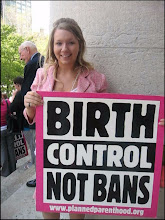My inspiration for starting this blog is that I live on a college campus, and I see a lot of people who I think need to Get F'ed (Feminist'd). Many college students have the liberal values in place to be a feminist, but are still afraid of the dreaded F word! I've encountered this problem quite specifically when trying to get Plan B onto my college campus. Even though we are a liberal arts school, we have NO WOMENS HEALTH SERVICES. That's right. No pelvic exams, which means no birth control. The only reproductive health services we have is that you can get a few condoms per visit at our health center. Are you shocked yet? If not, please read on, you will be.
These are the FACTS about Plan B:
Emergency Contraception (EC) can be up to 89% effective if used promptly, is easy to use and is less likely to cause an adverse reaction than aspirin. “Plan B” is one brand of EC, and can be used up to 72 hours (three days) after unprotected intercourse, contraceptive failure or rape in order to prevent pregnancy. Plan B does not require a prescription and is FDA approved. EC is sold over-the-counter to people over 18. Plan B is safe, and is not related to RU-486 (the abortion pill), as it would not affect an existing pregnancy if a pregnant woman were to take it.
Plan B is especially important to have on campus because of the limited time frame in which you can take it. Why not just get it at a local pharmacy? Well, many of the closest pharmacies only carry 1 dosage, and do not order another dose of Plan B until the first is sold. This means once Plan B is sold out, one would still have to wait for a new dosage to get shipped in! The pharamacies nearby that do carry it charge up to twenty dollars more, making Plan B cost fifty-some dollars instead of thirty-some dollars!
Beyond this, A number of Allegheny’s comparison schools (such as Bucknell University, Pittsburgh University, New York University, Wesleyan University, Bryn Mawr College, Muhlenberg College, College of Wooster, Ohio State University, and Cornell University) offer Emergency Contraception, such as Plan B, at their health centers. Because Allegheny College offers many other over-the-counter medications, there is no reason that “Plan B” should not be carried in our health center!
SARO (Students Advocating Reproductive Options) on behalf of which I'm blogging, is in the process of getting students to sign a petition to gain access to Plan B on campus. We don't expect it to be free, just available. This increased access is a standard of health care for students as can be seen by the number of our comparison schools carrying Plan B. Women on campus often cannot access EC anywhere else, as many of our local pharmacies sell out or over-charge for Plan B. Finally, we should have it in our health center because it is the main resource for health information on Allegheny’s campus.
WE CURRENTLY HAVE 346 SIGNATURES. If you are a student at Allegheny College, please sign the petition if you care about women's health or reproductive health. You can never know when Plan B might become important in your life, and because of the short time frame it can be taken in, we must have it available to students on campus instead of relying on pharmacies that may not have it.
If you are not an Allegheny College student, but are interested in helping, feel free to email AlleghenySARO@gmail.com. We are looking for any and all assistance we can find! If you need assistance with a similar campaign on your campus, also feel free to contact me-- maybe we can help each other.
This is the time to Get Feminist'd. We need all the support we can get!
